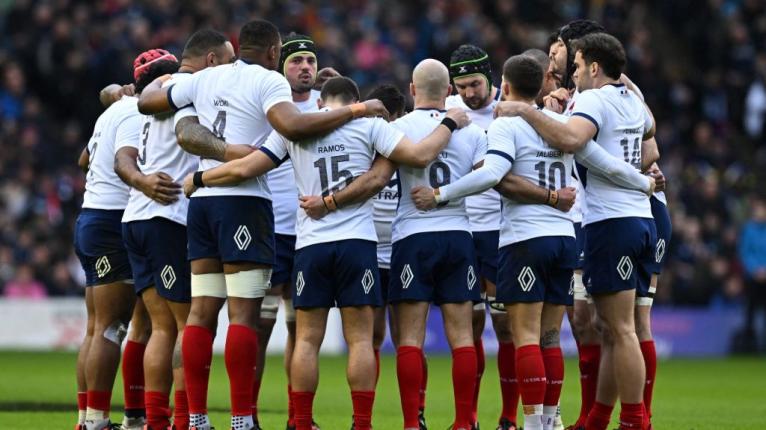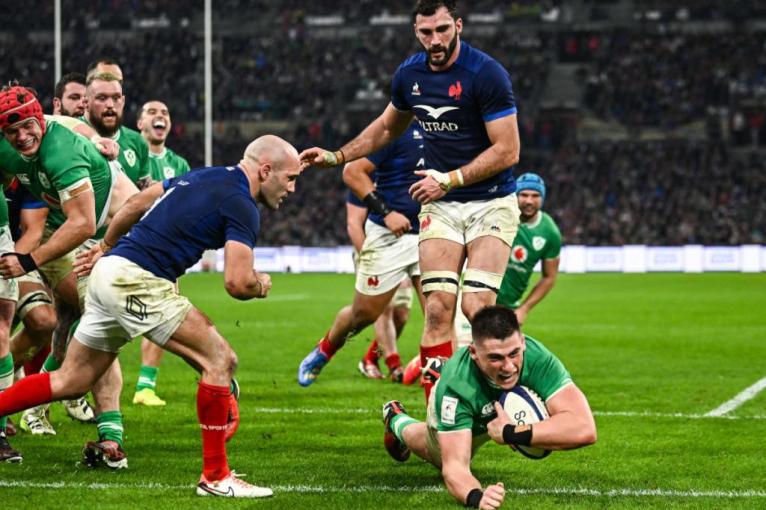Are the knives out for Shaun Edwards?
Professional rugby is a volatile business, indeed. Just a few months prior, Shaun Edwards was the focus of numerous positive French newspaper articles. The English genius known as “Monsieur Défense” was responsible for orchestrating France’s triumph in the World Cup.
Is that the sound of blades being sharpened six months later? This past week’s Midi Olympique included the title, “Shaun Edwards, called into question.”
An ungracious critique of Edwards’ impact on France since his appointment following the World Cup 2019 ensued. Indeed, Midi conceded, his “ultra-aggressive system” had paid off early on, leading to France’s first Six Nations victory since 2010 with the 2022 Grand Slam, but things had become worse from there. “There’s no denying that something has changed,” the newspaper said. “The evidence is that the Bleus have given up more than three tries on six occasions since the beginning of 2023, something they had never done in the previous three years.”
With the statement, “The Englishman… appeared somewhat disconnected from the rest of the staff during the last World Cup, spending long hours on his own,” Midi Olympique implied that Edwards was an outcast among the coaching group.

The piece posed the question of Edwards’ future. It was observed that in the match against Scotland, France’s fly-half, Matthieu Jalibert, who is not very strong defensively, was back defending via his usual route with good support from number eight Gregory Alldritt. Jalibert was defensively positioned in the middle by Edwards last year, but Midi claims that Fabien Galthié and Laurent Sempéré, his new forwards coach, “imposed” the change back to the 10 channel. Midi questioned, “Should these decisions be interpreted as a rejection of Shaun Edwards?” “Probably a little bit.”
Edwards was characterised as “prickly,” “tetchy,” and “angry” as he defended his record in the wake of Ireland’s historic 38-17 defeat.

Edwards has undoubtedly been impacted by the hatred that has surrounded French rugby ever since they lost to South Africa by a point in the World Cup quarterfinal. He was enjoying the hothouse atmosphere on the eve of the competition in France, as he stated in a newspaper column: “I can feel the buzz wherever we go.” The boys’ faces are on billboards across the city, and fans are waiting outside the hotel for autographs. I adore it. I adore the pressure that’s currently on us. It’s an honour.
Five months later, during the news conference on the eve of the Scotland match, Edwards mentioned pressure once more, but this time he did it in a serious manner. He was characterised as “prickly,” “tetchy,” and “angry” as he defended his record following Ireland’s championship-opening 38-17 loss. Reminding reporters, “We had the best defence at the World Cup.” The past four years have seen a 75% win ratio, with occasionally reaching 80%. The Ireland game is the only occasion I can think of where we fell short of our usual standards.
According to Edwards, the French squad who defeated Ireland in Edinburgh didn’t lose because of the TMO decision, but they also didn’t look good in the 20-16 victory versus Scotland.
After the France match, Edwards is said to have given the French team some “constructive criticism.” It will be a relief that Italy, who lost to Ireland in Dublin without scoring a point, will be the Bleus’ next opponent.
The media’s absurd assumption regarding Edwards’ status is absurd. Journalists who are questioning his abilities ought to look back a few years, to the disarray that constituted the Bleus during the 2010s.
France did not place in the top two of the Six Nations for eight years (2012–2019), and they were routinely humiliated by the dominant teams in the southern hemisphere, notably by the All Blacks, who destroyed them 62–13 in the 2015 World Cup quarterfinal.

Arguably, Edwards has had the biggest impact on France’s comeback this decade. Not only does he contribute to the team’s defensive framework, but his tough, no-nonsense Northern demeanour also plays a part. Since Edwards joined the French team, Jonathan Danty’s international career has now reached its full potential. Danty called Edwards’ coaching style “energetic and meticulous.” Furthermore, his energy and body language “express exactly the attitude he asks us to have on the pitch,” which helps us “better manage the emotion of the matches.”
Does Edwards’ nationality make him more susceptible to being used as a scapegoat if France’s performances falter?
Edwards is respected and admired by the athletes. “Shaun is still very valuable to us,” an unnamed French team member told Midi Olympique, citing his “communications, the way he constantly reminds us of the importance of going up hard, fighting, and continuing to defend after the tackle.”
The absence of several key players, including Antoine Dupont, Romain Ntamack (who is stronger defensively than Jalibert), Thibaud Flament, and Anthony Jelonch, is one of the reasons France is struggling in the Six Nations. Fatigue is another factor, and the new attack coaches, Sempéré and Patrick Arlettaz, are another. Only Italy has produced fewer line breaks and scored four tries in two games than France. However, Arlettaz hasn’t faced the same level of investigation as Edwards.
Is he more vulnerable because of his nationality in the event that France’s performances falter and a lamb must be sacrificed? Rugby in France is fairly regional. Out of the six countries, only they have never hired a foreigner as head coach. The Top 14 coaching circuit is populated mostly by familiar faces, and occasionally it seems like a network of Gallic Old Boys. Presidents, directors, and coaches frequently have a long history dating back to their amateur playing days.
Politics, which is always present, is woven throughout French ruby just as much as parochialism. The president of the FFR in 2019, Bernard Laporte, courted Edwards and said he was “honored” when the Englishman signed what is probably a big contract.
Laporte is no longer with us; he resigned in disgrace last year following his corruption conviction by a Paris court. Laporte’s archenemy, Florian Grill, has recently accused him of being responsible for the FFR’s “catastrophic” financial situation. Tightening of the screws has gone so far as to prevent the France team from staying in their customary five-star hotel in Edinburgh in order to save a few euros.
Additionally, Laporte was in charge of appointing the erratic Galthié as head coach. The two had a close relationship, and Galthié honoured his former manager following France’s historic 53-10 loss to England in the previous season.
Galthié was known for having a golden touch and was free to say whatever pleased him at the time. The night France lost to South Africa, that luxury was gone. Neither he nor Edwards—who in 2020 was referred to as having “golden hands” by a prominent French newspaper—are immune to harm.
If the FFR were to alter the coaching staff in any way before the 2027 World Cup, it would be a very foolish move. Similar to any business, a rugby team may occasionally experience setbacks as it grows and changes. The key is to resist giving in to fear or pressure and, most importantly, to ignore the media.
FOR MORE NEWS CLICK HERE



